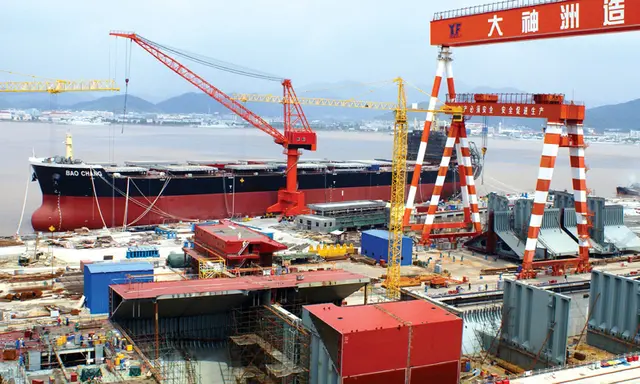Along the vast, misty Saijiang River in southeast China's Fujian Province, around 100 docked cargo ships await buyers amidst a winter chill on China's ship sales.
On the river banks, gantry cranes sit deserted. The only activity in sight is a few workers tinkering with a small fishing boat. It's hard to connect the spiritless place with one of China's top private shipbuilding bases.
"We are getting very few orders these days," said Zhang Qingjie, general manager of Huahai Shipbuilding Co. Ltd., a leading shipbuilder in Saiqi Township. In its heyday, Zhang's company boasted more than 1,000 employees, with 22 ships being built simultaneously on the bustling banks. "Now only around 20 people work in our company," Zhang said.
China's shipbuilding industry is experiencing severe economic stress this winter as new orders are slashed and companies are shut down.
The Baltic Dry Index (BDI), a barometer of the shipping industry's status, has plummeted almost 30 percent, dropping below 320 points in January, according to the latest figures. The BDI measures the shipping fees of dry cargo such as iron ore, cement, grain and coal. Falling BDI means weakening global demand for raw materials, thus less need for shipping services.
Sagging demand has already impacted China's shipbuilding industry, with orders for new ships falling 47.9 percent year on year to about 30 million dead weight tons (DWT) in 2015, according to the China Association of the National Shipbuilding Industry.
A good number of shipbuilding heavyweights in China have filed for bankruptcy, including the private Dongfang Heavy Industry Co. Ltd. and Mingde Heavy Industry Co. Ltd. in the eastern Jiangsu Province.
In November, the Wuzhou Shipbuilding Co. Ltd. headquartered in Zhoushan, Zhejiang Province, filed for bankruptcy, becoming the first state-owned shipbuilder to do so.
"A lot of shipbuilders may not make it through the winter," said Lin Ruijin, secretary-general of the Fu'an Shipbuilding Industry Association in Fujian Province.
In Saiqi Township, nine of the 43 large shipbuilding companies have already been wiped from the market, while only a few of the remaining 34 are still in operation.
Lin Musong, deputy general manager of the local Funing Shipbuilding Co. Ltd., said his company has slashed capacity by half, as ship sales have fallen by 50 percent.
"This is a tough year for us," Lin said.
Experts attribute the poor performance to a range of factors ,including dwindling global demand, lack of high-tech ships and China's excessive shipbuilding capacity.
Sailing on troubled water
For years, China remained the world's biggest shipbuilder, but now the market is changing.
On the Wukuishan Island in Zhoushan, what was once the country's model shipbuilding center is now a deserted island.
Wuzhou Shipbuilding Co. Ltd., located on the island, once took up more than 10 percent of China's shipbuilding market. In 2014, the company produced 12 percent of the country's ships. Only a year later, it went bankrupt.
"I think the failure of Wuzhou is partly a reflection of overcapacity in the market," said an official with Zhoushan's Economic and Trade Commission.
Zhuang Jianjun, deputy general manager of Zhongyuan Shipbuilding Co. Ltd., agrees.
"The global demand for new ships is about 50 million DWT annually, but the global capacity is at 100 million DWT, so that means about almost half of the world's shipbuilders will be wiped out," Zhuang said.
Another problem is China's making of mid- and low-end ships, which do not meet market demand, according to Chen Daxi, an official with Zhejiang Shipbuilding Engineering Association.
"China mainly makes dry bulk carriers, which are of low-technology and are easily affected by changes in the shipping industry," Chen said. "In recent years, high-tech ships like the LNG carriers have seen significant growth."
The Republic of Korea is now taking ship orders away from China by building high-tech ships, according to Chen, while Japanese shipbuilders are also posing a threat by leveraging its depreciating currency.
A beacon of hope
As urgency for change mounts, China is trying to find a way out by encouraging shipbuilders to offer high-end products.
The government is encouraging shipbuilders to go into the high-end sector, with a national guideline on the country's manufacturing in May emphasizing better investment in research and development in shipbuilding and marine engineering equipment.
A guideline drafted by the China Association of National Shipbuilding Industry was also recently completed. The guideline maps out plans for the industry to increase high-tech shipbuilding by 2020.
Government support is seeing good results.
In December, state-owned Shanghai Waigaoqiao Shipbuilding Co. Ltd. said it will build China's first cruise ship with technological support from Italian shipbuilder Fincantieri, with construction starting in 2017 and hopefully completing in 2020.
Also in December, Wuchang Shipbuilding Industry Group Co. Ltd. secured a deal to build a deep-diving vessel for Singaporean company Ultra Deep Offshore Ltd., the first order in 2015.
Shipbuilders are also using the Internet to try to boost sales. Zhang Qingjie, general manager of Huahai Shipbuilding Co. Ltd., said his company has launched two websites to promote international sales.
"We have big markets in some Southeast Asia countries, so we are working to promote our ships there."
One of the websites, shipfinder.com, currently receives more than 30,000 hits on a daily basis, with more than ten ships sold through the site so far, mostly to Southeast Asian nations. Zhang said a management team has been set up to further open the market there.
Meanwhile, shipbuilders are working together to boost sales in overseas markets. Lin Ruijin said that about 500 technicians from various shipbuilders in Fu'an are working together in Batam Island, Indonesia to make ships.
"While shipbuilders should grasp opportunities to strengthen themselves, the government should also step up investments in R&D in shipbuilding," said Wu Yousheng, an academic with the Chinese Academy of Engineering. Enditem
 简体中文
简体中文

